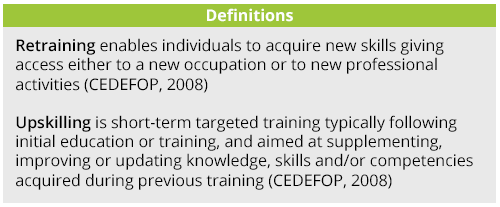
The UNESCO-UNEVOC International Centre: Who We Are | What We Do | Working With Us | Get in Touch
The UNEVOC Network: Learn About the Network | UNEVOC Network Directory
For Members: UNEVOC Centre Dashboard
Thematic Areas: Inclusion and Youth | Digital Transformation | Private Sector Engagement | SDGs and Greening TVET
Our Key Programmes & Projects: BILT: Bridging Innovation and Learning in TVET | Building TVET resilience | TVET Leadership Programme | WYSD: World Youth Skills Day
Past Activities: COVID-19 response | i-hubs project | TVET Global Forums | Virtual Conferences | YEM Knowledge Portal
Our Services & Resources: Publications | TVET Forum | TVET Country Profiles | TVETipedia Glossary | Innovative and Promising Practices | Toolkits for TVET Providers | Entrepreneurial Learning Guide
Events: Major TVET Events | UNEVOC Network News

Globally, the transition to greener economies will have significant structural implications on economic sectors. The International Labour Organization (ILO) has developed several scenarios to assess the potential impact of the transition. For example, the energy sustainability scenario (2°C increase by 2030 as opposed to a 6°C increase that would happen under ‘business-as-usual’ conditions) estimates that almost 25 million jobs will be created and nearly 7 million lost globally (ILO, 2019). Of the 7 million lost jobs, 5 million can be reclaimed through labour reallocation, while around 2 million will require reskilling in other occupations (ILO, 2019). The scenario also points to massive investment requirements to train workers in the skills required for close to 20 million new jobs.
To better understand which jobs will be created, changed and lost, each country needs to undertake a sector-by-sector analysis. The first step towards embedding sustainability in curricula and training therefore needs to start by looking at the impact the transition to greener economies has on economic sectors, and understanding the sectors that are affected. The second consideration will be to know the types of jobs that will be created, changed, and lost.
While all sectors will be impacted by the transition towards greener economies, some may experience greater changes than others. Jobs in high greenhouse gas emitting sectors have the potential to undergo substantial changes.

Advancement in green technologies and the decrease of high emission industries means that new jobs will emerge and existing profiles will be modified. Either way, workers will need to have the right skills to meet the needs of these changing and emerging job profiles.

The TVET sector must not only ensure that its curricula and standards are in line with today’s green skills needs, but it must also reflect these changes in the pedagogical strategies used, which must be underpinned by attitudinal changes in learners, trainers and communities.
Traditional instruction methods – such as lecture-driven delivery – are inadequate to equip learners with the required competencies. UNESCO (2006) highlights some of the considerations that should be factored in when developing pedagogical strategies to teach about sustainable development, including:
 Greening TVET |
 Advocacy |
 Capacity Building |
For information on any of the above activities, contact the Greening TVET team at unevoc.greeningtvet(at)unesco.org